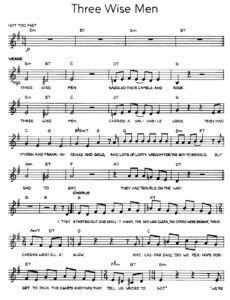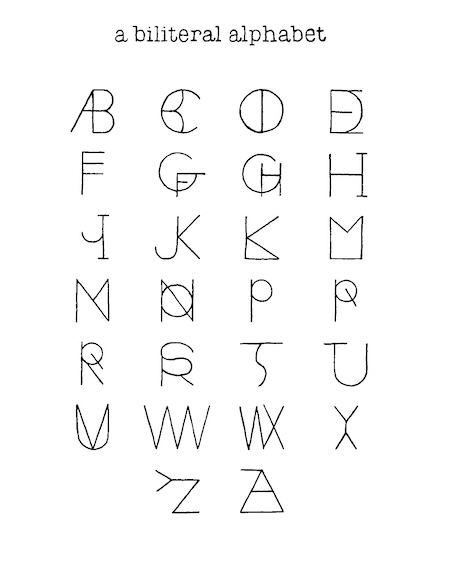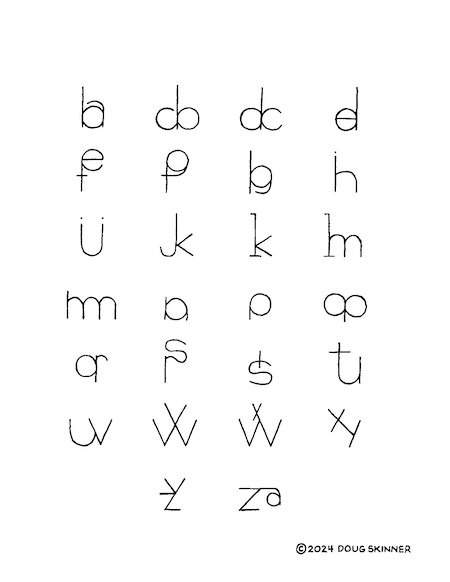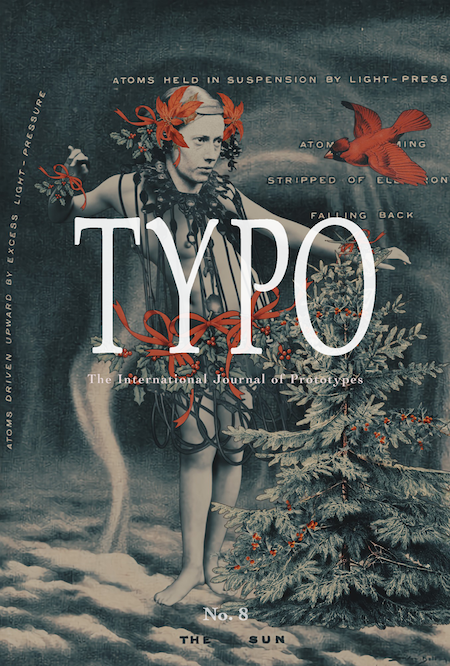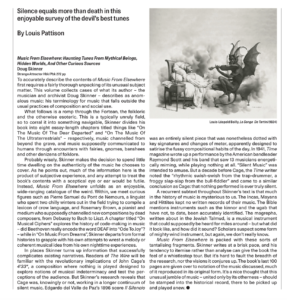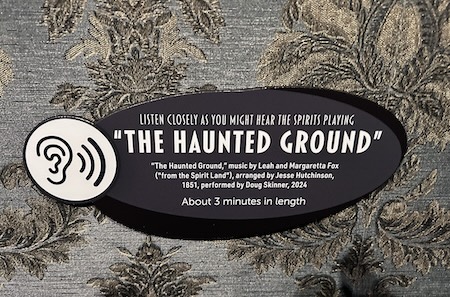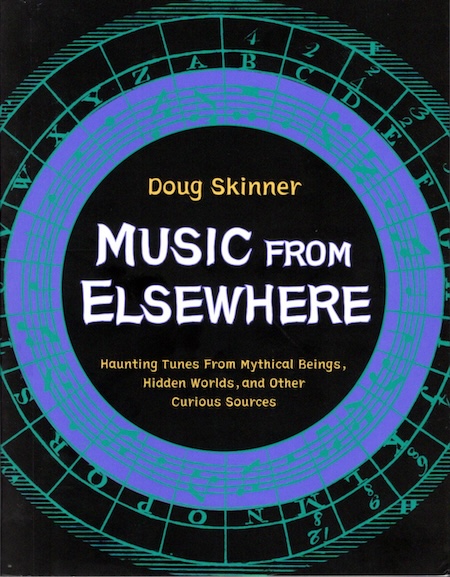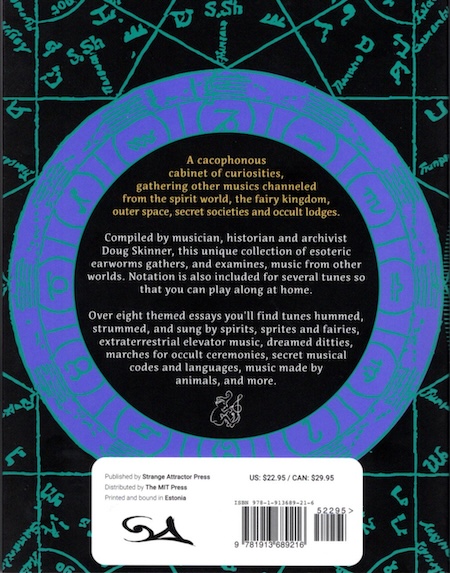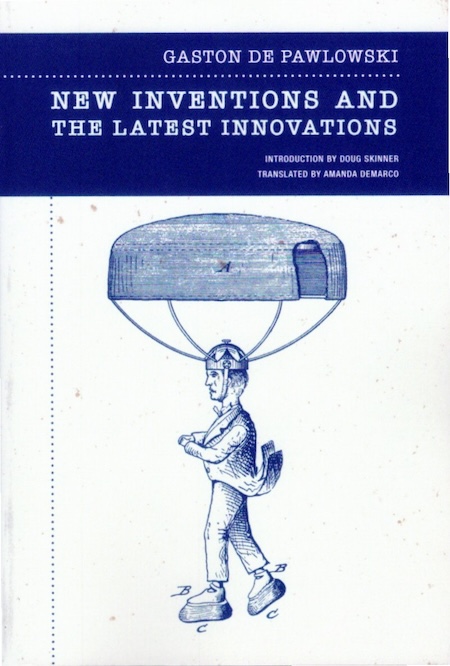For many years, Meg Reichardt has invited musicians to contribute a song to her annual Holiday Recording Party. Thanks to her, I’ve written more holiday songs than I would have imagined. My latest one is about that hapless trio, the Three Wise Men. You can listen to it here, and here’s the first page.
Three Wise Men
December 25th, 2024 · No Comments
→ No CommentsTags: *Music · T
A Biliteral Alphabet
November 11th, 2024 · No Comments
→ No CommentsTags: *Other · B
TYPO 8
November 4th, 2024 · No Comments
TYPO 8 is now available from Black Scat Books! I contributed “A Biliteral Alphabet” and a translation of “The Virtuoso Parrot,” a short story by the enigmatic 19th century writer Claude-Sosthène Grasset d’Orcet.
I’m surrounded by an international crowd of poets, essayists, fictioneers, and artists: Tim Newton Anderson, Tom Barrett, Terry Bradford, Steve Carll, Peter Cherches, Norman Conquest, Lynn Crawford, Jeanne Devlin, Jean-Christophe Duchon-Doris, Albert Ehrenstein, James Montgomery Flagg, Shawn Garrett, Edward Gauvin, Vasilisk Gnedov, Michael Gould, Allan Randolph Kausch, Amy Kurman, Julia Lillard, Emilia Loseva, George MacLennan, Zach Keali’i Murphy, Opal Louis Nations, Bernard Quiriny, Paul Rosheim, Marcel Schneider, Lono Taggers, Mark Valentine, Renée Vivien, Tom Whalen, Paul Willems, Carla M. Wilson, Danny Winkler, and Mark Wyatt. It’s edited and designed by the hard-working Norman Conquest, and it will entertain and stimulate you as only TYPO can.
→ No CommentsTags: *Words · T
“Music From Elsewhere” on Bandcamp
October 29th, 2024 · No Comments
You can now listen to selections from “Music From Elsewhere” on Bandcamp. I recorded 32 brief pieces from the book, with voice, piano, electronic keyboard, psaltery, sopranino recorder, and chord zither. Brian Dewan was the engineer. Here it is!
→ No CommentsTags: *Music · M
A Review
October 22nd, 2024 · No Comments
Behold! A review of Music From Elsewhere, by Louis Pattison, in the November 2024 issue of The Wire. (Please click for magnification.)
→ No CommentsTags: *Words · R
“Music From Elsewhere” on the Supernatural Mystery Symposium
October 13th, 2024 · No Comments
Greetings, music lovers! I’ll give a Zoom talk/concert about my book Music From Elsewhere in Shannon Taggart’s Supernatural Mystery Symposium, through the Viktor Wynd Museum in London on October 22, at 8:00 pm. I’ll play music attributed to fairies, trolls, trows, angels, aliens, time slips, and other unlikely sources, and suggest possible explanations.
POSTSCRIPT: The selections included:
“Fairy Dance”: an Irish fairy tune reported in 1888.
3 examples of the call of the banshee, from 1888, 1843, and 1892.
“Winyadepla”: a trowie tune from the Shetland Islands in Scotland.
“Norsk Troldmusik”: music of Norse trolls, reported in 1861.
“Regina cæli lætare”: Gregorian chant ascribed to angels.
“Outer space music” reported by Philip Rodgers in the 1950s.
“Mother Ann’s Song”: a Shaker “vision song” from 1844.
“The Haunted Ground”: a song by the Fox Sisters, 1851.
“An Adventure”: music reported from a supposed time slip in 1902.
“Disappointment”: a piece Rosemary Brown claimed she channeled from Schumann.
“Fort in Solrésol”: a passage by Charles Fort in the artificial language Solrésol.
“Fuga I”: an alchemical fugue by Michael Maier, 1618.
“Port na bPucaì”: an Irish tune ascribed to either fairies or whales.
Two tunes I heard in dreams.
→ No CommentsTags: Uncategorized
Conjuring the Spirit World
September 24th, 2024 · No Comments
If you happen to be in Salem, Massachusetts, do visit the current show in the Peabody Essex Museum, “Conjuring the Spirit World.” My recording of one of the pieces from “Music From Elsewhere,” a song by those original Spiritualists the Fox Sisters, will be wafting through the air. You can find more info here.
And here’s the sign informing visitors about the music, photographed by Shannon Taggart. Thanks, Shannon!
→ No CommentsTags: *Music · C
Music From Elsewhere
September 16th, 2024 · No Comments
Music From Elsewhere is now available from Strange Attractor Press!
This book collects and discusses music derived from unusual sources, including music attributed to fairies, trolls, trowies, banshees, aliens, angels, spirits, time slips, and dreams. You’ll also find chapters on speculative and cryptographic music, and on music from birds and other natural sounds. It’s 272 pages, richly illustrated in green and black (designed by the remarkable Tihana Šare), with 112 pages of historical sheet music. Also available in a limited hardback edition of 300, with a signed bookplate. Purchase includes a link to an MP3 album of Doug Skinner performing some of the music, recorded by Brian Dewan. Published by Strange Attractor Press in the UK, and distributed in the US by The MIT Press.
→ No CommentsTags: *Music · *Words · M
Painting the Cockatrice
August 31st, 2024 · No Comments
This story appears in my collection The Potato Farm. How does one go about painting a cockatrice, anyway? Here’s how it begins:
PAINTING THE COCKATRICE
I was working on a painting of a cockatrice, and was faced with a dilemma. Its gaze is lethal, which meant that if I painted it well, I would die. I had to admit, reluctantly, that it might be a poor subject for a painting.
I set down my brush and studied the canvas. The creature stared out at me, its baleful eye, meticulously rendered in Cadmium yellow, contrasting boldly with the scarlet comb and wattles. Its neck led down to a squat body and thrashing tail, their scales a mottled green. Its plumed legs ended in muscular feet, the left one raised, its sharp talons menacing the viewer. The anatomy was persuasive, the modeling effective, the brushwork, frankly, rather deft. But when I looked the animal in the eye, I didn’t die. I had failed.
I turned away from the easel and sank my head into my hands.
Somewhere a dog barked.
I sat up and listened. I’d read that sentence in hundreds of novels. In fact, it showed up in four I’d read in the past month: Buck Scarlatti’s searing indictment of humanity Your Values Are Disgusting, Dimity Etheridge’s farcical Pickles in the Pantry, Miff Derrick’s taut thriller Murder Hits the Big Time, and Georgia Crumit’s bucolic Fumigate the Henhouse. In each of these very different fictions, a dog, unidentified and presumably distant, broke the imaginary silence. I paid little attention to it. At best it set a mood; at worst it just inflated the word count.
But now I heard it myself, and became curious.
→ No CommentsTags: *Words · P
New Inventions and the Latest Innovations
August 7th, 2024 · No Comments
I wrote the introduction for Amanda DeMarco’s sparkling translation of New Inventions and the Latest Innovations, by Gaston de Pawlowski, now available from Wakefield Press. Here’s what Wakefield has to say:
Originally published in book form in 1916, Gaston de Pawlowski’s New Inventions and the Latest Innovations collects the humorist’s numerous columns mocking and deflating his era’s burgeoning consumer society and growing faith in science. From anti-slip soap, gut rests, and the pocket-sized yardstick to repurposed spittoons, nasal vacuums, new methods for curling endive, electric oysters, and musicographical revolvers, Pawlowski offers a far-sighted satire of technological gadgetry and our advanced society’s promise to remove discomfort from every facet of life, even as soldiers were dying daily in the trenches of World War I and technology was unleashing new horrors upon humanity.
Pawlowski’s humorous cultural critique and tongue-in-cheek celebration of uselessness and futility bears relevance for today, and not just because some of the absurdities described have since been invented: tech startups continue to receive inflated funding, and technology remains the hoped-for answer to our increasingly troubled human condition. Described with the excessive optimism of the sales pitch, these inventions of yesteryear were also an influence in the arts, admired by such figures as Marcel Duchamp and Raymond Queneau, and stand as a precursor to the work of such artists as Jean Tinguely and today’s looming specter of AI-generated images and text.
Gaston de Pawlowski (1874–1933) was a productive journalist, humorist, and bicycle enthusiast who wrote on everything from war correspondence to the fourth dimension. His friends and colleagues included Alfred Jarry, Marcel Proust, and Guillaume Apollinaire, but he is chiefly remembered today as being an influence on Duchamp’s The Large Glass.
→ No CommentsTags: *Words · N

